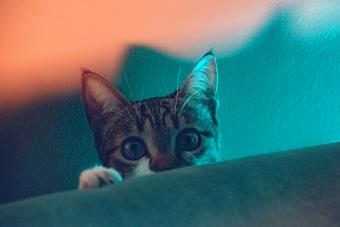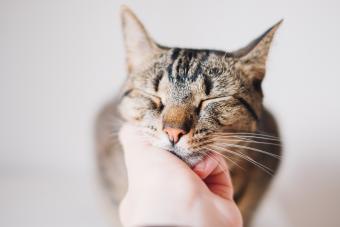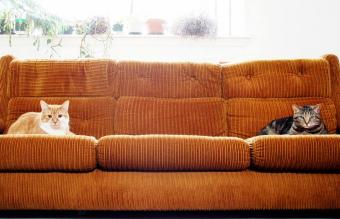
If you can't sleep because of your cat's yowling, you might wonder why they're meowing at night. It could be something as simple as boredom, or a serious medical condition causing their nighttime meowing, such as hyperthyroidism, hypertension, or cat dementia. Depending on your cat's age, gender, and any other symptoms they have, you can help identify why your cat is meowing at night and how to stop it.
Why Does My Cat Meow at Night?
Cats use meowing as a way to communicate with you. In fact, it's a sound they use only with people, and not when talking to other cats. But why do they feel the urge to meow in the middle of the night? There are six things your cat could be trying to tell you.
1. They're Sick
Increased vocalization, especially meowing at night, can be a sign that your cat could have a medical condition. Hyperthyroidism affects 10 percent of cats over the age of 10, and one of the telltale signs of this disorder is meowing at night. Cats with an overactive thyroid often experience weight loss, ravenous appetite, vomiting, hyperactivity, and unkempt fur. High blood pressure, kidney disease, and pain are other conditions that could cause nighttime meowing. Your veterinarian can perform an exam and run diagnostics to rule these out.
Even though most of these ailments affect older cats, young cats can meow from pain or other conditions. If it's a male cat who is meowing in the litter box, have them examined by a vet right away to make sure they're not experiencing a urinary blockage.
2. They're Lonely
Just as a puppy might cry at night while you are crate training them, a cat or kitten may cry if they miss you. Consider whether your cat has access to the bedroom, or if you keep them in a separate part of the house.
If they can't get to you, they might be yowling as a way to get your attention. It's possible they just want to be close to you. Talk to your veterinarian about solutions for separation anxiety, like pheromones or training techniques, and make sure your cat has a safe place to sleep where they feel comfortable.
3. They're Bored
On the other hand, your cat might yowl because they're bored. You're a significant source of their entertainment, so their nighttime calls might mean, "I want you to come and play." Make sure you give your cat plenty of stimulation and exercise during the day to help stave off any bored nighttime meowing.
4. They're in Heat
Do you have an unspayed female cat who won't stop yowling at night? She might be in heat. Most signs of heat are behavioral, like increased affection, rolling around on the ground, and yowling at all hours of the day. Unless you're planning to breed your cat, having them spayed will resolve this behavior and reduce their risk of mammary and reproductive cancers.
5. They're Territorial
Even if your cat doesn't need to defend their territory with housemates, it's possible stray or outdoor cats could bother them. Cats are naturally more active at dusk and in the wee hours of the morning because they're crepuscular. If your cat sees another cat on the other side of the window, they might meow at night as a signal to back off.
6. They're Getting Old
Ok, getting older doesn't exactly cause a cat to start meowing at night, but age-related changes can. Feline cognitive dysfunction, which is similar to dementia in humans, can affect cats over the age of 10. They might stare at walls, appear disoriented, urinate or defecate outside the litter box, experience changes in sleeping habits, and meow in the middle of the night.
Although cat dementia can't be reversed, mental stimulation and supportive care can help slow the progression and make your cat more comfortable. Older cats who are losing their hearing or vision might also cry out at night because they can't hear themselves. Just love them and help them cope with their condition as best you can.
Should You Ignore Your Cat's Nighttime Meows?
No, not only can it be difficult to ignore your cat meowing all night, but it could be dangerous. If they have a medical condition brewing, ignoring this behavior could make them even sicker. And if it is behavioral in origin, you'll want to take measures to make sure your cat is stimulated during the day. Your cat is trying to communicate that they need something, and until you discover what it is, their meowing may not stop. Make sure you have all their basic needs met, like water, food, a clean litter box, and companionship. Then have your veterinarian rule out any physical causes of their nighttime meowing.







